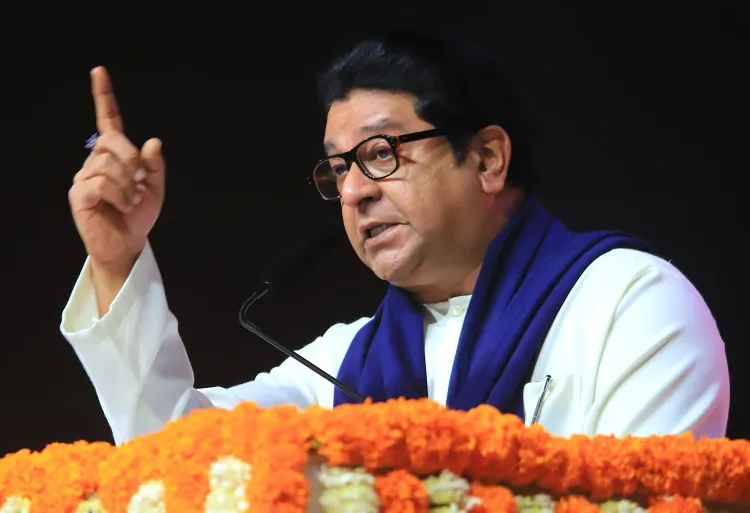Should MNS workers avoid talking to the media without permission?

Synopsis
Key Takeaways
- Raj Thackeray's directive limits media engagement.
- Directive issued amidst language enforcement tensions.
- Police denied permission for MNS morcha.
- Public reactions are varied and contentious.
- Implications for Maharashtra's political future are significant.
Mumbai, July 8 (NationPress) In light of the ongoing debate surrounding the enforcement of Hindi from grade one and incidents involving non-Marathi speakers, Raj Thackeray, the founder of the Maharashtra Navnirman Sena (MNS), has issued a strict directive to party members. He emphasized that no one should communicate with the media or engage on social media without his express permission.
In a message posted on X, Thackeray stated, “This is a clear instruction... No member of the party is permitted to speak to newspapers, news channels, or any digital outlets. Furthermore, refrain from sharing videos of your sentiments on social media. Official spokespersons designated for media interactions must also consult me before engaging with any media platform or expressing opinions online.”
Thackeray, who recently attended a joint rally with his estranged brother and Shiv Sena leader Uddhav Thackeray to commend the state government's decision to retract two resolutions regarding the introduction of Hindi from grade one, also cautioned party members against discussing any potential alliance with Uddhav Thackeray's faction.
This directive follows an incident where MNS workers were released after being restrained from organizing a morcha in Mira Bhayander concerning the Marathi issue, which they later participated in alongside the Marathi Ekikaran Samiti. Members of the Shiv Sena UBT also joined the demonstration.
Earlier that day, tensions escalated between MNS workers and the police as they attempted to carry out a morcha despite the police denying permission. Some MNS leaders, including Arvind Jadhav, voiced their frustration over the police granting permission to traders while denying it to them.
Chief Minister Devendra Fadnavis defended the police's actions, indicating that the requested route for the morcha was likely to incite conflict. “The MNS was insisting on a path that would lead to clashes, while the police suggested a standard route. The MNS’s refusal to comply led to the denial of permission,” he explained.
“Everyone, including the MNS, is entitled to organize a morcha in the state. However, if there's a risk of disrupting law and order, we cannot condone that. We aim for unity and progress in our state. Had the MNS agreed to take the proper route, permission would have been granted. That permission is available today as well as tomorrow,” said CM Fadnavis.
State Home Minister Yogesh Kadam noted potential law and order issues at the original venue requested by the MNS, urging them to choose an alternative location for the morcha. “We are willing to grant permission; however, they are unwilling to change the site. We are ready to provide permission even today, but certain court guidelines must be adhered to, and we must ensure there’s no law and order disruption,” he stated.
Despite this, the MNS maintained its position, resulting in police eventually granting permission for the morcha and releasing the detained activists.
Shiv Sena leader and transport minister Pratap Sarnaik expressed his dissatisfaction with the police's approach, asserting, “The police should not serve one party’s interests. I will address this with Chief Minister Devendra Fadnavis. I have communicated my concerns to the Police Commissioner regarding the arrests of Marathi Ekikaran Samiti activists, as no orders were issued from the Home Ministry. If traders were allowed a morcha, why was the Marathi Ekikaran Samiti not granted the same opportunity? This raises serious questions about the Mahayuti government’s actions in Mira Road.”
Meanwhile, BJP MP Nishikant Dube criticized Raj Thackeray’s actions, stating in a post on 'X', “This is a WikiLeaks record from 2007. When Raj Thackeray lacks public support, he resorts to goondaism; his only aim is to instigate violence out of fear of failure in the upcoming BrihanMumbai Municipal Corporation elections. Hence, I oppose Thackeray's hooliganism. The limits of tolerance have been surpassed.”
On the previous day, Dube stirred controversy with his remarks directed at Shiv Sena UBT chief Uddhav Thackeray and Raj Thackeray, asserting, “You are surviving on our resources. What industries do you possess? If you dare to assault Hindi speakers, you should extend that aggression towards those speaking Urdu, Tamil, and Telugu. If you consider yourselves powerful, venture beyond Maharashtra to Bihar, Uttar Pradesh, and Tamil Nadu – we will retaliate.”
Dube condemned the Thackeray brothers for their hostility towards Hindi-speaking individuals in Mumbai and accused them of engaging in “cheap politics” in light of the recent debates surrounding the Marathi language policy. He questioned their selective outrage in this ongoing dispute.
Notably, both Chief Minister Devendra Fadnavis and Cultural Affairs Minister Ashish Shelar distanced themselves from Dube’s statements, emphasizing that undermining the contributions of Marathi individuals and Maharashtra to the GDP would be inappropriate.










